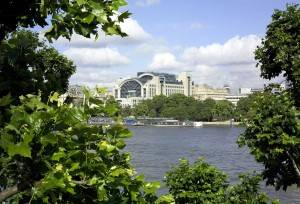January 31, 2013
New York state of mind to increase building energy efficiency by 20percent

In one of the most ambitious green initiatives in the United States, New York Governor Andrew Cuomo has issued an Executive Order directing state agencies to increase energy efficiency in state buildings by 20 percent in seven years. He also announced Build Smart NY, a plan to strategically implement the Executive Order by accelerating priority improvements in energy performance. The largest and most inefficient buildings will be addressed first and undergo comprehensive whole-building improvements, including new lighting fixtures and controls, heating, ventilating and air-conditioning systems and automated energy management systems. (more…)







 If you don’t already subscribe to our weekly newsletter – Insight – please join the thousands of workplace professionals, facilities managers, real estate experts, suppliers, service providers, architects, designers and specifiers from a wide range of business sectors and around the world who do by filling out your name and email on the right. Or see the
If you don’t already subscribe to our weekly newsletter – Insight – please join the thousands of workplace professionals, facilities managers, real estate experts, suppliers, service providers, architects, designers and specifiers from a wide range of business sectors and around the world who do by filling out your name and email on the right. Or see the German cities dominate the investment prospects for Europe’s commercial real estate sector as investors favour safe havens according to a new report –
German cities dominate the investment prospects for Europe’s commercial real estate sector as investors favour safe havens according to a new report – 


 The news from the weekend that Axa Real Estate is looking to raise around £1bn to invest in buildings with very long leases has resparked the debate into what sort of lease represents the best value for investors and tenants in these uncertain times. The new fund will target commercial properties with minimum twenty year leases even though investors have to pay a premium for such properties and the majority of occupiers don’t want them.
The news from the weekend that Axa Real Estate is looking to raise around £1bn to invest in buildings with very long leases has resparked the debate into what sort of lease represents the best value for investors and tenants in these uncertain times. The new fund will target commercial properties with minimum twenty year leases even though investors have to pay a premium for such properties and the majority of occupiers don’t want them. 








January 31, 2013
A Field Guide to Workplace Terminology
by Simon Heath • Comment, Facilities management, News, Property, Technology, Workplace design
As the ecosystem around the workplace industry grows ever more complex, so too does the language we use to describe it. In an attempt to bring order to chaos, guest writer Simon Heath presents here a glossary of terms, acronyms and abbreviations to help you navigate these linguistic waters. (For example Business Intelligence – A commonly used oxymoron.) For more of Simon’s worldly, wise and witty writing on all things work and workplace related, visit his blog at https://workmusing.wordpress.com.
(more…)